
Sign up to save your library
With an OverDrive account, you can save your favorite libraries for at-a-glance information about availability. Find out more about OverDrive accounts.
Find this title in Libby, the library reading app by OverDrive.



Search for a digital library with this title
Title found at these libraries:
| Library Name | Distance |
|---|---|
| Loading... |
A fresh look at the Pulitzer Prize–winning poet laureate of the American Midwest
With the publication of Chicago Poems in 1916, Carl Sandburg became one of the most famous poets in America: the voice of a Midwestern literary revolt, fusing free-verse poetics with hard-edged journalistic observation and energetic, sometimes raucous protest.
By the time his first book appeared, Sandburg had been many things—a farm hand, a soldier in the Spanish-American War, an active Socialist, a newspaper reporter and movie reviewer—and he was determined to write poetry that would explode the genteel conventions of contemporary verse. His poems are populated by factory workers, washerwomen, crooked politicians, hobos, vaudeville dancers, and battle-scarred radicals. Writing from the bottom up, bringing to his poetry the immediacy of America’s streets and prairies, factories and jails, Sandburg forged a distinctive style at once lyrical and vernacular, by turns angry, gritty, funny, and tender.
With the publication of Chicago Poems in 1916, Carl Sandburg became one of the most famous poets in America: the voice of a Midwestern literary revolt, fusing free-verse poetics with hard-edged journalistic observation and energetic, sometimes raucous protest.
By the time his first book appeared, Sandburg had been many things—a farm hand, a soldier in the Spanish-American War, an active Socialist, a newspaper reporter and movie reviewer—and he was determined to write poetry that would explode the genteel conventions of contemporary verse. His poems are populated by factory workers, washerwomen, crooked politicians, hobos, vaudeville dancers, and battle-scarred radicals. Writing from the bottom up, bringing to his poetry the immediacy of America’s streets and prairies, factories and jails, Sandburg forged a distinctive style at once lyrical and vernacular, by turns angry, gritty, funny, and tender.







